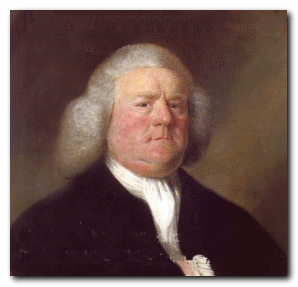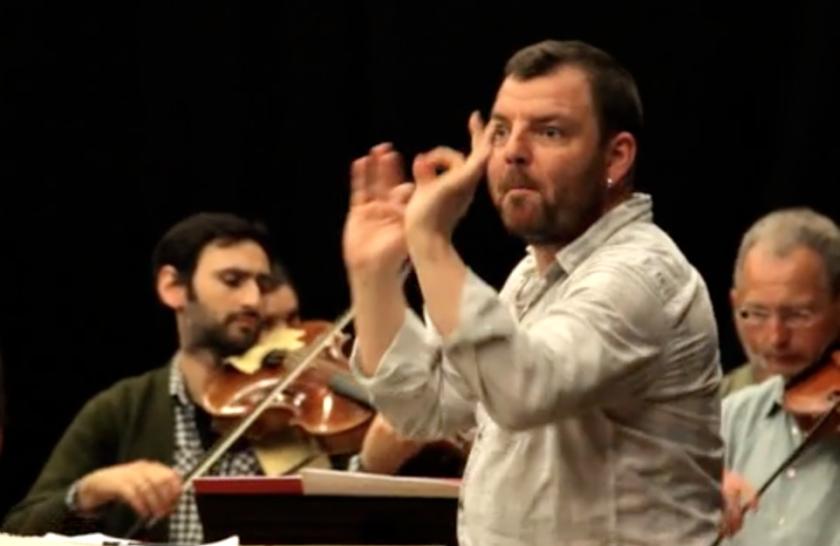Of all the epithets you could pin on that roast beef of Old England, William Boyce, “gamechanger” is one of the more unlikely. Like any good 18th-century Englishman, this composer followed the widespread Italianate model of the late Baroque, infused it with Handel, and a swig or two of Purcell, and just got to work. Latterly he spent far too much time setting toadying odes for Britain’s Hanoverian kings; no chance for revolution there.
But “Gifted Conservatives”, unlike “Gamechangers”, wouldn’t today be an enticing name for a concert season’s thematic link. So there he was, Boyce the gamechanger (pictured below) and his once-popular serenata Solomon of 1742: the closing attraction in the Orchestra of the Age of Enlightenment’s current season of programmes featuring the “sounds that shocked audiences and challenged conventions”.  You might also invoke the Trade Descriptions Act over this concert’s second descriptive tag, “mildly rude?” Victorian audiences apparently shrank from some of the words in the text distantly derived from the Bible’s Song of Solomon. But Victorians, remember, also wanted to cover up piano legs. What if soloists James Gilchrist and Mary Bevan sang the words “breast” and “delicious kisses” during their arias or recitatives? I was more worried by the poet’s comparison of the heroine’s teeth to dripping wet lambs, newly shorn. Teeth?
You might also invoke the Trade Descriptions Act over this concert’s second descriptive tag, “mildly rude?” Victorian audiences apparently shrank from some of the words in the text distantly derived from the Bible’s Song of Solomon. But Victorians, remember, also wanted to cover up piano legs. What if soloists James Gilchrist and Mary Bevan sang the words “breast” and “delicious kisses” during their arias or recitatives? I was more worried by the poet’s comparison of the heroine’s teeth to dripping wet lambs, newly shorn. Teeth?
Still, it was pleasant fun, nearly every minute of it. After the first half’s samples of Handel’s fizzing art – a Chandos Anthem, bonbons from his Solomon oratorio, incuding The Arrival of the Queen of Sheba – Boyce’s opening sinfonia initially sounded strait-jacketed and plain. But as the pastoral dialogue wended its way – Solomon himself was soon forgotten, and the Queen of Sheba never showed up – the music soon picked up energy. Sweet melodies, tripping rhythms, bustling fugal choruses, and instrumental details tickled the ear. Matthew Truscott’s violin injected neat trills; Andrew Watt’s bassoon gently burbled; Lisa Besnosiuk’s flute sang like a bird. And, directed by Steven Devine from his gorgeous green harpsichord, the corporate élan of the OAE and the Choir of the Enlightenment never faded.
As the libretto’s nameless shepherd, James Gilchrist and his tenor voice took a little time to warm up. But he grew in vigour with the night, and ended punching out librettist Edward Moore’s silly words as if they really mattered. He did some acting too, shivering nicely as the poet dowsed him with “chilling frosts” (Purcell’s musical influence bubbled up here), and casting his adored one an endearing soppy look as bliss arrived in the finale.
Soprano Mary Bevan, his companion in love, was a last-minute replacement for the advertised Lucy Crowe. During Handel’s anthem Let God Arise she seemed too busy reading her score to be eloquent. Happily, in Solomon Bevan opened up more, but never to Gilchrist’s degree. Still, we shouldn’t be too hard on her: she’d probably expected to spend the day lolling in her garden, not singing obscure William Boyce.
The choir itself, 13-strong, sang with mellifluous aplomb, whether slimmed down for the unaccompanied “Chorus of Virgins” or bustling with the orchestra through Boyce’s sturdy counterpoint. With Gilchrist they also flew equally well in Handel’s Let God Arise. I’ll not forget the two oboes, either, swinging in tandem like identical twins through "The Arrival of the Queen of Sheba". But this was Boyce’s concert, and Solomon – never rude, not a gamechanger – proved delightfully well worth reviving.














Add comment